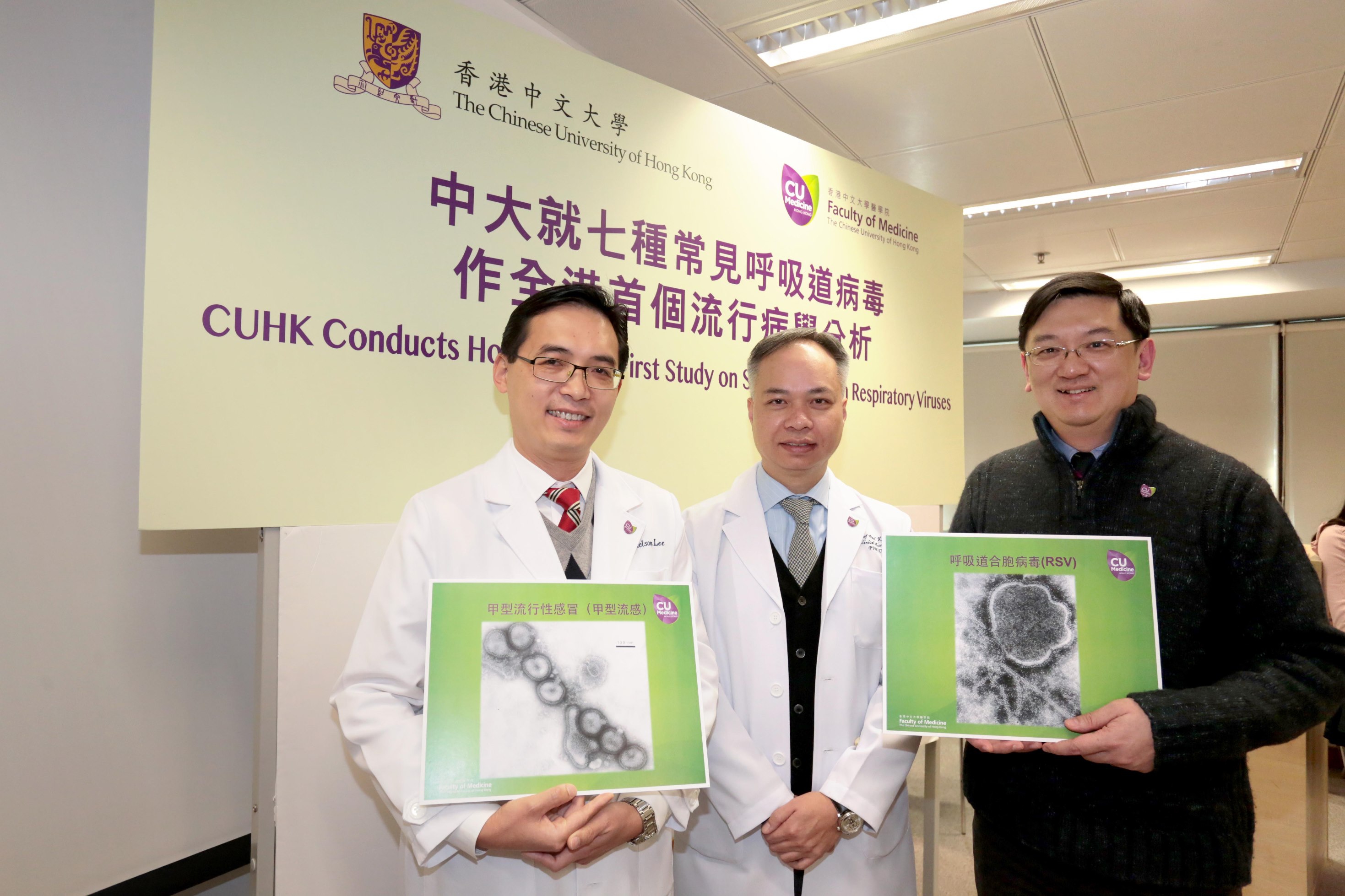CUHK
News Centre
CUHK Conducts Hong Kong’s First Study on Seven Common Respiratory Viruses Revealing Respiratory Syncytial Virus and Influenza A as Prevalent Fatal Types
The Chinese University of Hong Kong (CUHK) has conducted a 15-year study to examine the incidence of hospitalization and death, and the seasonality of seven common respiratory viruses in Hong Kong. The results reveal that February to March is the peak season for respiratory viral infections. From the seven studied viruses, namely influenza A, influenza B, respiratory syncytial virus (RSV), adenovirus, and parainfluenza virus type 1, 2, and 3, the results show that RSV and influenza A are the two most prevalent fatal types, mainly affecting young children and the elderly. It is the first study in Hong Kong to provide comprehensive local epidemiological data for these important viruses and the findings have already been published in the November 2015 issue of the journal Medicine.
Respiratory viral infections carry comparatively high rate of hospitalization
Respiratory viral infections are the main causes of hospitalization and severe cases can lead to death. In order to study the prevalence of the viruses in the city, the Department of Microbiology, in conjunction with the Department of Paediatrics, and the Division of Infectious Diseases of the Department of Medicine and Therapeutics, Faculty of Medicine, CUHK analysed 19,405 patients admitted to the Prince of Wales Hospital from 1998 to 2012 with laboratory-confirmed respiratory viral infections. According to the study, it is estimated that 1 in 23 children under the age of five and 1 in 300 elderly people aged 65 and above are admitted to hospital due to respiratory viral infections each year. Furthermore, about 1 in 16,000 children (under the age of five) and 1 in 4,000 elderly (aged 65 and above) in Hong Kong die of respiratory viral infections every year.
The findings also reveal that RSV and influenza A are the most prevalent fatal viruses among the seven studied viruses. 37% of children (under age of five) admitted for respiratory viral infections were infected with RSV, while 25% of them were infected with influenza A. As for the elderly (aged 65 and above) who died of respiratory viruses, 48% were influenza A and 20% were RSV.
Experts call on rapid diagnostic test for RSV and Influenza A
Professor Paul Kay Sheung CHAN, Chairman, Department of Microbiology, Faculty of Medicine said, ‘In the light of the study results, we suggest that public hospitals implement a rapid diagnostic test targeting RSV and influenza A for patients with respiratory infection symptoms, especially for children under the age of five and older people aged 65 and above, in order to provide early diagnosis and prompt treatment and reduce the risk of death.’
Professor Ting Fan LEUNG, Chairman, Department of Paedetrics, Faculty of Medicine added, ‘RSV is the prime virus leading to bronchiolitis and pneumonia for infants under the age of one. Virtually, all children have been infected with RSV before they reach the age of two. Common symptoms include stuffy nose, sore throat and low-grade fever, and some may happen to have difficulties in breathing.’ Professor LEUNG encouraged breast feeding which can help strengthen the immune system of infants, so as to lower the chance of RSV infections before the age of one. Since the virus can stay active on hard object surfaces for 6 hours, he suggested the public should pay attentions to personal hygiene and transmission control, such as hand washing and sterilizing toys.
Professor Nelson Lai Shun LEE, Head, Division of Infectious Diseases, Department of Medicine & Therapeutics, Faculty of Medicine explained, ‘Influenza virus can cause serious infections and is worse in those with chronic medical conditions. Vaccination is a safe and effective mean for prevention. Early detection with better technology and initiation of antiviral treatment can reduce severity and mortality. Measures to prevent transmission in the healthcare setting are highly important.’
Countermeasures needed to prepare for seasonal upsurge
Overall, a pattern of seasonal activity in respiratory viruses is observed in Hong Kong. The peak season in Hong Kong is between February and March, and the medium season lasts from April to August with a tendency towards increases in most of the mentioned viruses.
Professor CHAN suggested prevention and preparedness for respiratory virus infections should be a public health priority — elderly homes, schools and alike should prepare in advance. Public hospitals should have plans for resource and service redistribution to cater for the expected upsurge.
Hong Kong is facing an increase in hospitalization of patients with respiratory virus infections. A joint effort from health professionals, administrators and public individuals is needed to strengthen prevention and interrupt transmission.
(From left) Prof. Nelson LEE, Head, Division of Infectious Diseases, Department of Medicine & Therapeutics, Prof. Paul CHAN, Chairman, Department of Microbiology and Prof. Ting Fan LEUNG, Chairman, Department of Paedetrics, CUHK present Hong Kong’s First Study on Seven Common Respiratory Viruses, revealing two prevalent fatal types.





